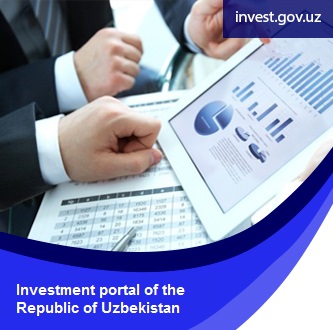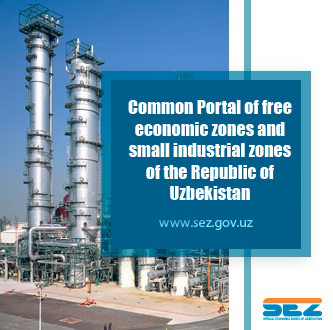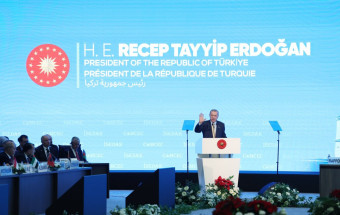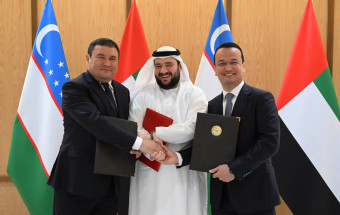Transport and Foreign Trade:
new perspectives and urgent tasks
Over the past five years, the economy of Uzbekistan has grown by 24%, industry - 34%, the volume of exports has increased by 1.5 times, foreign investments - 3 times.
To ensure high rates of economic growth in the next five years,
$120 billion will be attracted, of which at least $70 billion will be foreign investments.
Projects based on public-private partnership will attract
$14 billion in investments in the transport sector, road construction and other areas.
In the next five years, the Republic of Uzbekistan plans to increase economic growth by 1.5 times and GDP to $100 billion, and the volume of industrial production by 1.4 times.
The country's export potential will increase 1.7 times and will reach
$30 billion in 2026. In the export structure, the share of raw materials will be reduced by half to 23%, and the volume of finished products will increase by 2.5 times.
According to preliminary estimates, the total volume of cargo transportation in the country will increase by 1.2 times, and the volume of international cargo transportation (export, import and transit, excluding pipeline transport) by 1.5 times.
Sustainable development of the economy and foreign trade, as well as improving the welfare of the population cannot be ensured without advanced development of transport, infrastructure and logistics.
In this regard, in recent years, Uzbekistan has given priority to the development of international transport corridors, digitalization of the logistics chain, including the processes of cargo promotion and vehicles through border crossings, reducing physical and non-physical barriers to the movement of international goods, optimizing transport and other costs in the contract value of export products, increasing the speed of delivery of goods, improving the country's indicators in the World Bank's LPI (Logistics Performance Index) rating, etc.
A number of cardinal decisions were made long before the onset of the COVID 19 pandemic, which made it possible to get out of the global crisis with minimal losses.
In accordance with the Resolutions of the President of the Republic of Uzbekistan DP-4707 07.05.2020 "On measures to further support export activities", a system of partial compensation of transport costs associated with the transportation of export products, regardless of the type of transport, has been implemented.
The railway transport
Concrete measures are being taken to increase the throughput capacity of the main transport routes, modernize the rolling and carrying stock of the country's railway transport which accounts for the lion's share of the transportation of foreign trade goods.
During the pandemic, about 5,600 covered wagons, 1 280 refrigerators and special wagons were involved in international cargo transportation.
At the same time, according to preliminary estimates, the railway sector in the next 5 years requires an additional 7 thousand freight cars. In this regard, it is planned to establish the activities of private logistics operators who have at their disposal wagons and containers. The state will only regulate issues related to railway infrastructure and locomotive services, and the provision of freight cars will be based on market principles. Due to this, the benefits for private entrepreneurs when importing railway cars are extended until January 1, 2025.
Uzbekistan is an inland country with a high share of transport costs in the contractual value of exports. Successful competition in world markets requires a decrease in the cargo intensity of exports, an increase in the share of high-tech products in it, a significant expansion of the range of finished and deeply processed products. At the same time, it is necessary to strengthen positions in the traditional markets deployed within a radius of
2-3 thousand km.
The road freight transport
Based on this requirement, it is necessary to give priority to the development of road freight transport. According to the Association of International Freight Forwarders of Uzbekistan, as of July 1, 2021, the number of vehicles participating has increased by 3.1 times in international freight transport compared to 2017.The cargo fleet was updated due to Euro 4-6 trucks, and the volume of international freight traffic increased 1.5 times through the provided customs privileges in 2017.
Thus, 1127 companies take part in the international transportation of goods, 62% of the fleet of which consists of vehicles not lower than Euro 4 standards. Strengthening the vehicle fleet is not only of international importance and as an instrument of competition with rail transport, but also as a base for expanding employment. So, over the past five years, over 50 thousand new jobs have been created by the private sector involved in international transport through the purchase of trucks.
In accordance with the Decree of the President of the Republic of Uzbekistan DP-5225 dated August 19, 2021 "On additional measures to support freight carriers by road", zero rates of customs duty, recycling duty and road fees for the purchase of vehicles are established for a period until January 1, 2025 when importing to the Republic of Uzbekistan of the following vehicles intended for the carriage of goods, released no more than 7 years ago:
- vehicles (HS codes 8701 20, 8704 22 (except for dump trucks) that meet the requirements of the ecological class "Euro-5" and higher;
- trailers and semi-trailers (HS codes 8716 31, 8716 39).
The following vehicles manufactured in the countries of the European Union, from the date of release of which have passed no more than 7 years, are exempt from mandatory certification for import into the Republic of Uzbekistan for a period until January 1, 2025:
- cargo and special vehicles that meet the requirements of the ecological class "Euro-5" and higher;
- trailers and semi-trailers used for the carriage of goods by road.
These measures will increase the share of road transport in the transportation of export and import goods of the country, significantly improve the quality of services at the level of 3 and 4 PL.
The air transport
It should be noted that according to the International Civil Aviation Organization (ICAO), the pandemic has dealt a devastating blow to civil aviation.
Thus, the losses of the EU could range from $57 billion to $98 billion. As for domestic flights, the damage is estimated depending on the scenario of the development of the pandemic from $10 billion to $18 billion.
Uzbekistan's air transport has also suffered significantly from the pandemic. At the same time, thanks to the support of the state, aircraft fleet is being modernized, the geography of flights is expanding, the number of foreign companies that have received the right to carry out regular and charter flights to major cities of Uzbekistan.
From October 1, 2019 at the international airports of Bukhara, Nukus, Karshi and Termez, the "Open Skies" regime was introduced with the fifth degree of freedom, which allows foreign companies to fly from Uzbekistan not only to the country of their registration. "Open sky" was introduced at the airports of Karshi, Nukus, Termez, Bukhara, Navoi and Urgench - without any restrictions.
At the airports of Andijan, Fergana, Namangan and Samarkand - with the granting to all foreign airlines of the ICAO member states of the right to operate passenger flights to these airports without frequency limitation, taking into account the technical capabilities of airports, including the fifth freedom of air, on routes that are not operated by the designated carriers of Uzbekistan.
Foreign airlines are granted the right to operate cargo flights up to the seventh freedom of air at the airports of Navoi and Termez. The "Open Skies" mode with the seventh degree of freedom allows any foreign airlines to fly, regardless of their country of registration and with any frequency. Foreign airlines interested in the opening of new routes or planning to increase the number of flights, must submit the necessary documents to the Aviation Agency under the Ministry of Transport.
According to foreign experts, Tashkent has unique opportunities to become a major International Harbor connecting East with West, South with North.
As a result of the implementation of a new terminal construction project worth more than 80 million dollars between "Air Marakanda" LLC and "Uzbekistan Airports" JSC, the new terminal complex of "Samarkand" International Airport was opened on March 18 of this year.
In 2017-2021 reforms were carried out aimed at developing the country's transport and transit potential, modernizing railway transport, as well as increasing the throughput of roads, airports, logistics centers, border, customs, sanitary, phytosanitary, veterinary and transport control points.
In general, 2016-2021 more than 30 decrees and resolutions of the President of the Republic of Uzbekistan and the Cabinet of Ministers of the Republic of Uzbekistan were adopted on further development, transport, logistics and transport infrastructure.
In particular, in accordance with the Decree of the President of the Republic of Uzbekistan dated January 28, 2019 DP-5643 "On measures to improve the management system in the field of investments and foreign trade”, the priority tasks of the Ministry of Investment and Foreign Trade are:
- creation of favorable conditions for the access of local goods and services to foreign markets;
- formation of efficient transport corridors;
- diversification of the geography of supplies of export products to foreign markets;
- development of modern logistics networks.
By the Resolution of the Cabinet of Ministers of the Republic of Uzbekistan dated May 10, 2019 DCM-390 "On approval of the on the Ministry of Investments and Foreign Trade of the Republic of Uzbekistan ", the following tasks are assigned to the Ministry:
- development of foreign trade infrastructure;
- increasing the transit potential;
- improvement of logistics and transport corridors;
- diversification of export routes;
- jointly with interested ministries and departments to develop and submit to the Cabinet of Ministers of the Republic of Uzbekistan proposals on foreign trade policy in the field of transport, transport communications and international logistics;
- preparation of proposals for expanding practical cooperation with foreign countries in the field of transport and logistics;
- integration of the transport and communication system in international transport communications;
- development and implementation of measures to create new transport routes (corridors);
- issuance of an opinion on the transit of dangerous goods, weapons, military equipment, military property, explosives and products in transit through the territory of the Republic of Uzbekistan, etc.
In accordance with the approved programs, over the past period a multimodal transport corridor "China - Central Asia - South Caucasus - Turkey" has been created, which connects the Republic of Uzbekistan with the countries of the Pacific region. Regular cargo transportation has been launched along new alternative transport corridors, such as:
- "Uzbekistan - Kazakhstan - Russia - Georgia - Turkey";
- "Uzbekistan - Kazakhstan - Azerbaijan - Georgia - Turkey";
- "Uzbekistan - Turkmenistan - Azerbaijan - Georgia - Turkey";
- "Uzbekistan - Afghanistan - Pakistan", etc.
The analysis shows that these transport corridors can significantly catalyze international trade, increase foreign investment and improve the living conditions of people.
The key to success is continued reforms that enhance transparency, expand international trade, improve debt sustainability, and mitigate environmental, social and corruption risks.
Meanwhile, the countries of the region along the corridors still have certain infrastructure gaps and an insufficient level of harmonization and unification of transport policies. Trade and investment policies are often restrictive, and trade agreements between countries along which corridors run tend to be fragmented.
In this regard, the volume of trade in these countries is below potential by 50%, and the volume of foreign direct investment - by 70-80%. Duration of downtime at borders in countries with low performance indicators can be 40 times higher than in the countries with the highest economic performance. According to ADB, a one-day reduction in travel time in the region, such as Belt and Road, could increase trade between countries by up to 5.7%.
According to experts, international transport corridors will also help to solve key problems associated with optimizing transport costs, reducing travel time and at checkpoints.
On the other hand, successful development and further diversification of transport corridors could increase the potential for participation of Uzbek entrepreneurs in the value chain linking the corridor countries. This would make it possible to increase the volume of value-added products in regional imports, as well as to increase the share of Uzbek producers in the domestic value added reflected in the exports of other countries. In this case, Uzbekistan could acquire the status of a center of gravity for the countries located along these corridors.
The development of corridors is directly related to the use of the seaports of Latvia, Lithuania, the Russian Federation, Ukraine, Kazakhstan, Azerbaijan, Georgia, Pakistan, Turkey, Iran and China for the transfer of goods to Uzbekistan.
These steps are in synchronized with the introduction of mechanisms "One window", "Green corridor", "One stop", "E-TIR", "E-Freight", "GLONASS", "GSM", "RFID", and others for the transportation of foreign trade goods, especially agricultural products to foreign markets.
The steady growth of foreign trade is partly an indicator of the success of Uzbekistan's foreign policy.
On this subject, the formation of reliable, round-the-clock and year-round transport and communication ties should become one of the main drivers for the further development of the economy of Uzbekistan and the entire region in the long term.
For all questions regarding international transport, it is recommended to contact the following addresses:
Railway transport:
“Uzbekistan Temir Yollari” JSC
Phone: (+998 71) 237-98-17 (41-817),
237-97-67 (41-767), 238-89-60 (48-960)
Website: https://www.railway.uz/ru/uslugi/gruzovye_perevozki/158/
E-mail: mm@uzrailway.uz.
Address: Tashkent city, st. T.Shevchenko, 7.
“O'zbektemiryo'lekspeditsia” UE
Phone: (+99871) 238 8417,
238 8407, 238 8866,
238 8752, 238 8811;
Address: Tashkent city, st. T.Shevchenko, 7.
“O‘ztemiryo‘lkonteyner” JSC
Phone: (+99878) 148 3778
Website: https://www.utk.uz
E-mail: info@utk.uz
Address: Tashkent city, st. Fargona ways, 13/11.
Air transport:
According to appeals to “Uzbekistan Havo Yollari” JSC and
“Uzbekistan Airports” JSC.
“Uzbekistan Airways” JSC
Phone: (+998 78) 140-20-93 / 94/95
Website: https://corp.uzairways.com/uz/yuk-tashish-qoidalari
E-mail: cargo@uzairways.com
Address: Tashkent city, Amir Temur Avenue, 41
“Uzbekistan Airports” JSC
Phone: (+998 78) 140-28-26, 140-28-21
For cargo booking: (+998 78) 140-28-25
Website: https://corp.uzairways.com/ru/uslugi-po-perevozke-gruzov-i-pochty
E-mail: sopgp@uzbairports.uz
Address: Tashkent city, st. Kumarika, 13.
“Uzbekistan Airports” JSC
Phone: (+998 78) 140-28-26, 140-28-21
For cargo booking: (+998 78) 140-28-25
Website: https://corp.uzairways.com/ru/uslugi-po-perevozke-gruzov-i-pochty
E-mail: sopgp@uzbairports.uz
Address: Tashkent city, st. Kumarika, 13.
Road transport:
Association of International Road Carriers
Phone: (+99871) 273-03-13, 273-97-75
Website: www.aircuz.uz
E-mail: aircuz@ars.uz
Address: Tashkent city, st. Bunyodkor, 44.
International cargo or passenger transportation:
Ministry of Transport of the Republic of Uzbekistan
Phone: (+998 71) 202-22-55, 241-72-01
Website: www.mintrans.uz
E-mail: info@mintrans.uz
Address: Tashkent city, st. Zulfiyakhanym, 3.
Ministry of Foreign Affairs of the Republic of Uzbekistan
Phone: (+99871) 233 4501, 233 6946, 233 2828
Website: www.mfa.uz
E-mail: info@mfa.uz, consul@mfa.uz, murojaat@mfa.uz
Address: Tashkent city, st. Amir Temur, 3
Export Development Agency under the Ministry of investment, industry and trade
Phone: (+99871) 252-42-18
Website: www.epauzb.uz
E-mail: logistics@epauzb.uz
Address: Tashkent city, st. Shevchenko, 34A.
Ministry of Investment, industry and trade
Phone: (+99871) 238-50-32 / 35
Website: www.miit.uz
E-mail: info@miit.uz, mf85@miit.uz, mf86@miit.uz, mf87@miit.uz, mf96@miit.uz.
Address: Tashkent city, st. Islam Karimov, 1.





